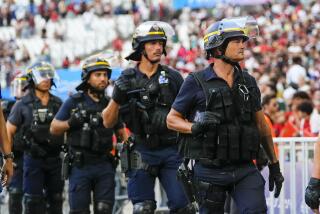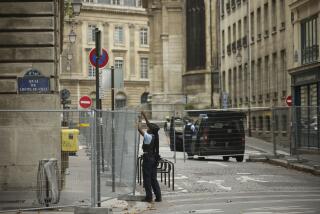France Arrests 2 Agents for Ship Bombing Leak : Disclosures to Press of Attack on Greenpeace Protest Vessel Charged by Intelligence Unit
- Share via
PARIS — Official French sources announced Tuesday that the government has arrested two French intelligence agents--not for bombing the anti-nuclear protest ship Rainbow Warrior but for leaking information about the attack to the press.
The arrests were made by the security service of the French intelligence agency itself. Official sources said the two men were detained and accused of disclosing to journalists from Le Monde and other French newspapers that a secret team of two commandos had actually put the two bombs on the hull of the ship.
It was this news, first published in Le Monde last week, that prompted President Francois Mitterrand and Premier Laurent Fabius to force the resignation of Defense Minister Charles Hernu and to dismiss the director of intelligence.
The Rainbow Warrior, owned by the Greenpeace environmental organization, was blown up in New Zealand on July 10, causing the death of a Greenpeace photographer who was on board and, eventually, bringing humiliation to the French government.
Fabius said Sunday that the agents who carried out the attack will not be punished because they “only obeyed orders.”
Detained for Own Safety
The two men who leaked the information, the official sources said, were also detained for their own safety. They were said to be in danger because other agents regard them as traitors who, by identifying the commando team, have put the lives of their associates in jeopardy.
One of the two arrested men was identified by a government-owned television network as Capt. Paul Borras; the other was not identified. Reuters news agency, quoting judicial sources, said a third man, a military officer, was also held for giving information to the press.
Meanwhile, Le Monde said Tuesday that Hernu probably gave the order to get rid of the Rainbow Warrior. Neither Mitterrand nor Fabius was informed of the order, Le Monde said.
Le Monde writer Edwy Plenel said he discussed Hernu’s probable role with Bernard Tricot, the member of the Council of State who was assigned in August by Mitterrand and Fabius to investigate the case.
Tricot, in his original report, cleared France of all responsibility for the sinking, but Fabius announced Sunday that it has become clear that the truth was hidden from Tricot by lying officials.
Told what Le Monde had learned, Tricot said: “I do not exclude the possibility of an outburst by the minister of defense. He probably did not say, ‘Sink that ship for me.’ But he probably said, ‘Do something about it and do it quickly.’ That is not unreasonable.”
Consistent Denials
The 63-year-old Hernu, a friend of Mitterrand for 30 years, has consistently denied any knowledge of any order to sink the ship and insisted, when he resigned last Friday, that he had only found out the day before that his officers had lied to him.
Questioned about the Le Monde article by television reporters in the city of Lyon, Hernu dismissed it, saying, “It would have been stupid to neutralize a ship in a foreign country.”
In both the headline and in an introduction to its article, Le Monde said the agents had been ordered to “neutralize” the boat. But that did not make the scenario any more palatable to Hernu. “To neutralize means to eliminate,” he said.
Plenel, in his article, went further than Tricot in blaming Hernu but, following the practice of most Le Monde disclosures in the affair, used the conditional tense a good deal of the time. Le Monde introduced its account by saying, “All could have happened according to the following scenario.”
Le Monde said that Hernu, under pressure from Adm. Henri Fages, head of the French nuclear testing center on Mururoa Atoll in the South Pacific, had decided that something had to be done to prevent the Rainbow Warrior from leading a flotilla of protest ships into the testing area this year.
The Le Monde account said that Gen. Jeannou Lacaze, then the armed forces chief of staff, and Gen. Jean Saulnier, then the president’s personal military adviser, were informed of Hernu’s decision. But the newspaper said that Mitterrand and Fabius were not informed.
Plenel wrote that since the order was probably oral, there would be no record of it.
More to Read
Sign up for Essential California
The most important California stories and recommendations in your inbox every morning.
You may occasionally receive promotional content from the Los Angeles Times.













